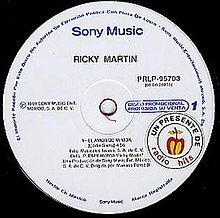| "El Amor de Mi Vida" | ||||
|---|---|---|---|---|
 | ||||
| Single by Ricky Martin | ||||
| from the album Ricky Martin | ||||
| Released | February 25, 1992 | |||
| Recorded | 1991 | |||
| Genre | Latin pop | |||
| Length | 4:56 | |||
| Label | Sony Discos | |||
| Songwriter(s) | Eddie Sierra | |||
| Producer(s) | Mariano Pérez | |||
| Ricky Martin singles chronology | ||||
| ||||
| Audio | ||||
| "Ricky Martin - El Amor de Mi Vida (Audio)" on YouTube | ||||
"El Amor de Mi Vida" (English: "The Love of My Life") is the second single from Ricky Martin's debut solo album Ricky Martin . It was released on February 25, 1992.
Contents
A music video was also released.
The song reached number eight on the Hot Latin Songs in the United States.
In 2001, "El Amor de Mi Vida" was re-recorded and included on Martin's greatest hits album La Historia . In 2008, it was also included on another compilation, called 17 . The new version was produced by Danny López and Tommy Torres.
The original song was previously released by Eddie Sierra on his third album Esta Todo Bien (1990).